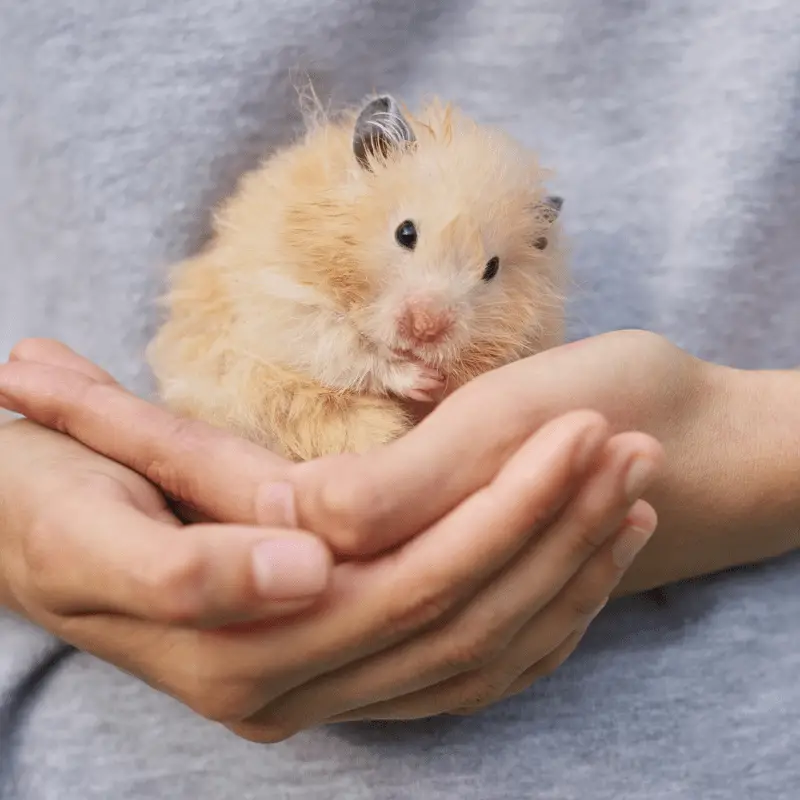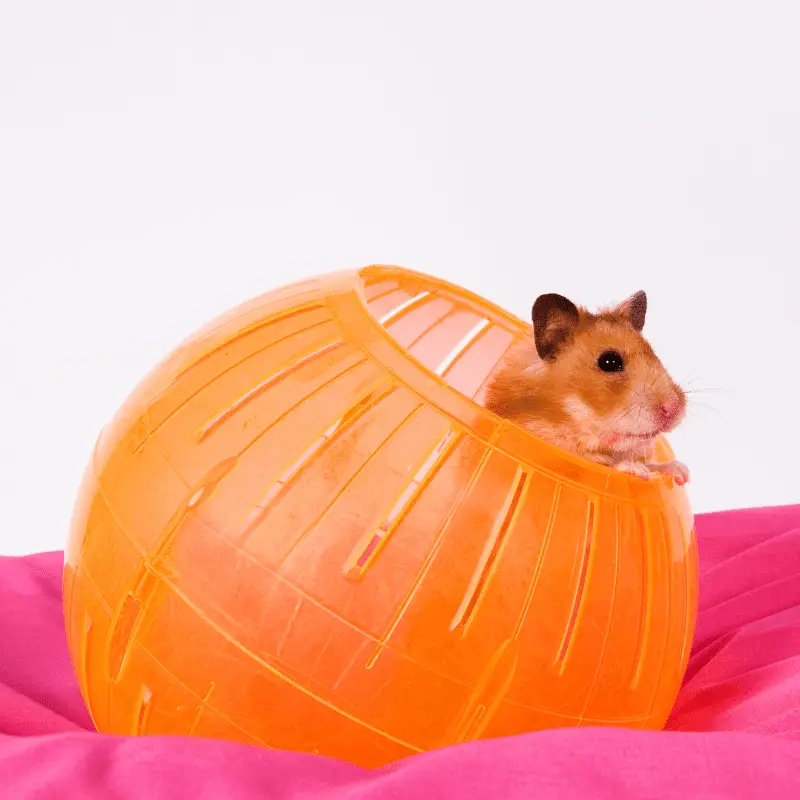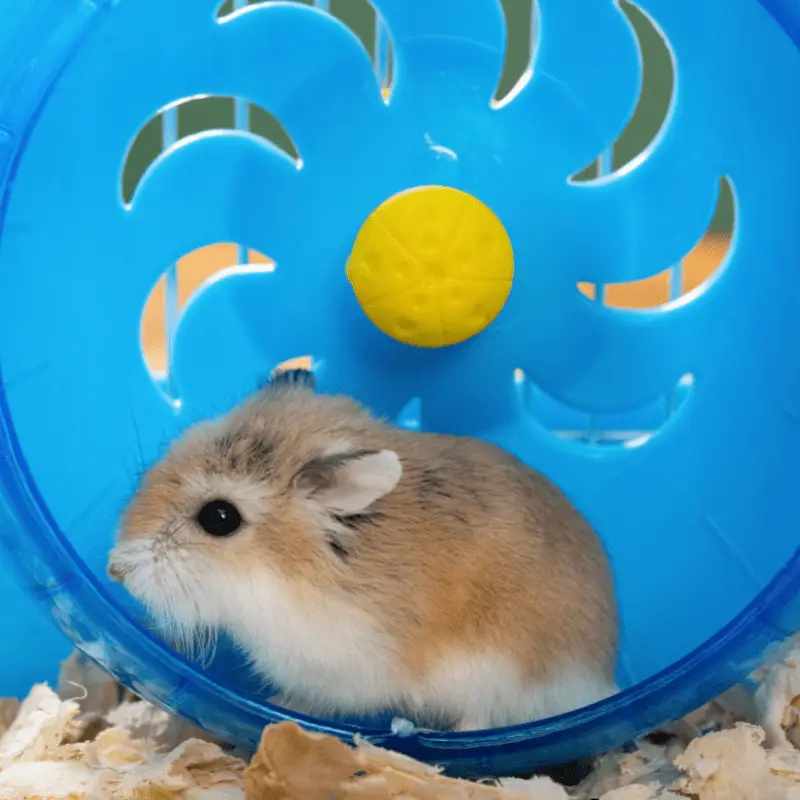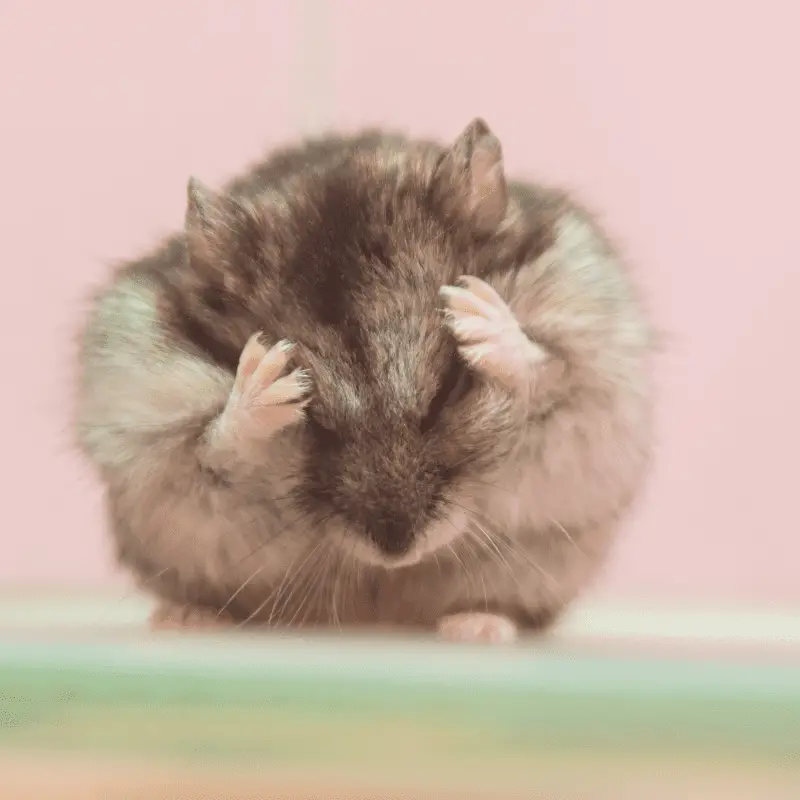If you have a hamster as a pet, you must have noticed that they love to groom themselves. But have you ever wondered why your hamster keeps on grooming itself?
Hamsters are clean creatures by nature. Therefore, they keep on grooming themselves to maintain cleanliness and hygiene. However, excessive grooming behaviour could signify something serious such as an infection, stress, dandruff, or skin parasites.
As you can see, many reasons why a hamster keeps on cleaning and licking their fur and skin. Hamsters are, by nature, very neat and clean. So unless they are showing excessive grooming behaviour to the point of barbering themselves, there is no need to worry about your hamster’s health. Let’s learn about their cleaning habits to understand when to worry if it’s excessive and how you can help your hamster.
Why Hamsters Developed The Grooming Behavior?
The wild Hamsters developed the grooming behaviour to keep the predators at bay. As hamsters are prey to many animals, they need to develop tactics to avoid attracting any predators. If they do not keep on grooming themselves, their scent will catch the attention of predators, like snakes, wildcats, and owls.
That is why hamsters have created a cleaning routine that helps them remain invisible to their predators. As this behaviour keeps these little furry animals alive in the wild, they are very particular about it.
Hamsters would like to start the grooming routine after every small interaction with elements that can leave a scent on them. That includes interaction with other animals, like fellow hamsters or humans. Hamsters even clean themselves after consuming food.
You will see that your hamster starts to groom itself from the hip area. The unique thing about the hip region is that from here, these animals secrete a particular scent that spreads throughout its body. As Hamsters keep cleaning the hip area, this scent gets reduced, keeping Hamsters safe from predators.
Their habitat is yet another reason why hamsters have developed a grooming routine for themselves in the wild. These tiny creatures live underground. Their caves consist of a series of nests and tunnels. So, when they move around their home, their fur often gets matted with dirt. The grooming process helps hamsters to function correctly. This behaviour is so essential that if your hamster suddenly stops grooming itself, you should contact your veterinary professional. In addition, it would be best if you kept an eye on your pet hamster and seek help if it keeps on looking unclean even after completing a grooming session.
The Common Reasons Why Your Hamster Cleans Itself
Hygiene
Hamsters are one of the cleanest animals. Each day, they spend several hours cleaning themselves. When they are not sleeping, playing, or feeding, they keep on preening to keep themselves clean. You can observe your hamster scratch all over their body with their tiny feet during this personal hygiene routine. During this process, your hamster will lick its body, feet, and other parts. It will also brush its ears and hair to keep it neat and clean. If you have a hamster, do not worry much about its cleanliness, as most animals do a better job than you.
However, not all hamsters are the same. While some are efficient groomers, others are simply lazy and don’t want to groom themselves quite as often. So, it is better not to compare the grooming behaviour of your hamster with others. If you suspect that something is wrong with the grooming behaviour of your hamster, better consult with a veterinary professional.
Marking Their Territory
Even though they are pretty small in size, Hamsters are very territorial animals. They do not like any scent on them other than their own. So if you touch your hamster while it is playing, most likely, it will start cleaning itself right away. This behaviour shows that hamsters do not want humans, or any other animals for that matter, to come near themselves or their territory. Hamsters are incredibly solitary, and they love to be on their own.
Stress
By nature, Hamsters are timid animals. They get scared all too easily. If these animals get mishandled or stay in a strange place for a long time, they become stressed or go into depression. Grooming themselves can help your hamster to reduce the level of stress. That is one reason why when you bring a hamster home from a pet store or rescue centre, you will see it groom itself rigorously.
When stressed, hamsters start to groom themselves disturbingly. Stress grooming is so different from the regular groom that you can spot the difference quickly. Not touching your hamster frequently can reduce stress. You can also keep your other pets away from your hamster to reduce their stress level. Loud noises and the change of place can also make your hamster groom their faces extensively.

For additional stress symptoms, check whether your hamster is biting their cage or not. If it keeps on biting the cage, along with grooming itself excessively, the chances are, your hamster is very stressed. In this situation, take the necessary actions to reduce your furry little pet’s stress level effectively. If you fail to do that, the excessive level of stress can cause death.
Skin Infection or Allergies
Hamsters can groom themselves excessively if they are suffering from allergies or other diseases. Your pet can develop a skin infection if you let your hamster play in dirty places. Bites of tropical insects can also cause allergies and skin infections. If you see your hamster grooming and scratching itself continuously, then take a closer look. This examination may help you to spot the problem. Once you know what is wrong with your hamster, it would be easier for you to take the necessary steps. If left untreated, allergies can cause serious health issues.
Parasites From Other Pets
Besides hamsters, if you have any pets at your home, you should take them to the veterinary professionals to check for worms. If you do not do that, your other pets can infect your hamsters with parasites and worms.
There is no doubt that your hamster will keep on grooming themselves to get rid of the parasites. The problem is, some of them are severe and do not leave the host pet that quickly. In this situation, you can take the help of a veterinary professional. Other than this, a sand bath can help your hamster as well. Just like chinchillas, they will love a sand bath. The best way to prevent these issues is to take care of your other pets, especially if you have dogs and cats at your home.


Dandruff
Well, like their human companions, hamsters can also suffer from dandruff issues. Dandruff in the thick fur of a hamster can cause a lot of itching. If you watch your hamster grooming itself vigorously, chances are they have dandruff in their fur. Dandruff can occur due to many reasons. One of the main reasons is dry bedding. Improper diet is yet another reason why hamsters develop dandruff.
Consulting with a veterinary professional is the best way to fight the dandruff problem of your hamster. You can also reduce the trouble by changing the diet of your pet. Add chunks of carrot, few drops of olive oil, and a bit of cheese into their regular diet. All these ingredients will help to reduce dandruff and keep your hamster away from grooming itself too harshly.
How to Stop Your Hamster From Grooming Itself Excessively?
Grooming is a natural behaviour of a hamster. Suppose your hamster keeps on grooming itself, then there is more than likely nothing wrong with your hamster. But if the grooming session turns excessively long and your hamster starts to barber themselves, you need to pay attention. Take your hamster to the veterinary professional to check whether it is facing any issues. If the grooming behaviour is a bit abnormal, you can try to mend it on your own as well. Here are some tips that can help you in this regard
Clean The Cage
Hamsters are very clean pets. So cleanliness is one of the essential parts of their care. If you want it to keep your hamster healthy and happy, then establish a cleaning session first.
Clean the cage of your hamster at regular intervals. Check all the cage corners and clean the litter so that mites do not enter the cage. It is the only way to keep your hamster clean all the while. It is also one of the easiest ways to stop your hamster from over-grooming itself.
Sunlight
Even though your hamster may like to be hidden in cold and dark corners, it requires a bit of sunlight to remain healthy. So keep the cage in a well-ventilated place where your hamster can get enough sunlight. This simple step will help you in reducing the excessive grooming behaviour of your hamster for sure.
Hamster Ball
You can also use a hamster ball and put it in the garden for ten minutes to get some sun and fresh air. However, you must stay and watch closely to ensure your hamster does not get escape. See some Hamster balls here on amazon!

Warning: some hamster balls can come undone, especially if your hamster hits the ball against hard surfaces. Never leave your hamster unattended.
Diet
A healthy diet keeps your hamster happy and improves its immune system. Your hamster needs a balanced diet to live a long and healthy life. An imbalanced diet can make your hamster overweight, clumsy, and aggressive. Angry hamsters often over-groom themselves and get hurt in the process. Talk to your vet to create a well-balanced diet for your little pet. Also, keep a spinning wheel inside of the cage so that a hamster can digest their food by spinning it.

Conclusion
All in all, the grooming and scratching behaviour in your hamster is nothing abnormal. But if you see that your hamster is grooming itself rigorously, get in touch with a vet right away.

